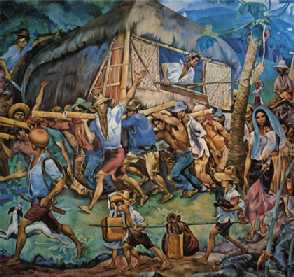I T IS AUSPICIOUS that the new Constitution was ratified on the month of February, the middle of which is punctuated by a celebration among persons who love one another.
"LOVE" -- that controversial word -- was incorporated, heatedly debated upon, stricken off broken to pieces for study, until finally reinstated into the charter after a clear definition was arrived at. It is now found enshrined in the new Constitution of the Republic of the Philippines.
WILL POWER EXPRESSED
There were those who argued that the word "love" had no place in a document as dignified as a constitution. Legal verbologists considered it to be indecorous from the standpoint of the language of law. We would be the laughing stock of the world, said the cynics, for including such an "improper", utterly "un-legal" expression -- and in the Preamble at that!
"Love" in the new constitution, as human love is eventually conceived of, means the highest and strongest EXPRESSION OF THE WILL OF AN INDIVIDUAL. We speak of "will power", don't we? And isn't it a most evident truth that when you want some good so badly, you have to admit that you love it? Hindi mo lamang "kursunada", hindi mo lamang "gusto", kundi "ibig na ibig" mo!
And when that WILL POWER is harnessed FOR THE GOOD OF ANOTHER PERSON, then it's got to be St. Valentine's Day -- never mind the date and time. 
Will power, when expressed by A collectivity of persons who care for the good of their fellow citizens is usually called the "will of the people" or the "political will". It means letting our fellow Filipinos know -- by deeds and not sweet words alone -- that we are greatly interested in their attaining their fullest possible development as persons.
That, in essence, was what happened in EDSA, February of 1986.
TRUTH AND THE EXPRESSION OF POLITICAL WILL
The "regime of love" stated in the Preamble of the New Constitution cannot be explained by Mills and Boon romance novels or Lovelife Komiks-Magasin. It requires an thoughtful assent, an appreciation of one another's qualities. Love is not aimless. It must be guided by truth. I cannot possibly love something I know nothing about. I can love something or someone that I know. As A famous poet wrote to his beloved, "The more I have known, the more I have loved." The more I learn about what can be good for you, the more I can want it too. The more I can love you.
Thus, love is not mere emotional or sentimental languor, but that indomitable yearning for the well-being of another. It requires most of all an understanding of one another's privations and defects. In fact, the first test of true love is the realization and acceptance of the other person's defects. Excerpts from a poet's loveletter ~

You uttered a half complaint once
that I only lov'd your Beauty.
Have I nothing else then
to love in you but that ?
Do not I see a heart naturally furnish'd
with wings imprison itself with me ?
No ill prospect has been able to turn
your thoughts a moment from me.
If acceptance of both beauty and ill-prospect is necessary for personal love to flourish, then the same must be true of love among members of society. They must be informed truthfully about the state of the nation and matters of public interest. Hence, the role of truthfulness -- sincerity and objectivity -- in mass media cannot be overstressed. Good news or bad, you've just got to say it like it is. The mutual relationships, the social bonds, the pursuit of common goals simply cannot prosper without truth in social communications. A people deceived is like a loved one betrayed. Understanding is the touchstone of development.
How can a people decide -- to agree with or to oppose -- and want something so much, if they know so little about it? We must WANT TO BE INFORMED about the things we, the citizens, need to know. Media practitioners must WANT TO COMMUNICATE the things that the people need to know. Persons entrusted with public office must long to reveal to the public what the public needs to know. Otherwise, we would be lost in a gamut of socio-political infatuations.
Another poet wrote: "We love the things we love for what they are." And may we add: We love them, too, for what they can and ought to be.
THE MOTIVE FORCE OF JUSTICE
Justice does not come about spontaneously. A motive force is needed to make sure that justice prevails. Such a force resides in the WILL of every citizen -- i.e., in the power of each Filipino to choose and to act in favor of the common good.
Actual experience has proven that in order to attain the common good, legal justice alone is not sufficient. The fact is that there is a peculiar tendency for persons to avoid performing their duties. These shortcomings and defects of some will unavoidably require others to transcend mere justice. In the face of the lopsided tendency favoring injustice, the only way to recover justice is by WILLING EVER SO MUCH TO ATTAIN IT, in spite of the odds. In other words, LOVING IT. Then, let love translate understanding into action.
Social justice for the poor and underprivileged can never be attained without preferential love that goes beyond the call of duty. This is why the will must be trained and disposed to act beyond the call of duty.

Contrary to what some cynical barristers and sophists claim, love does not destroy justice. This, rather, is what love does to justice: When justice is lost, love recovers it; and once justice is regained, love perfects it.
PEACE OF HEART
The human heart was made to love. It is "naturally furnished with wings", as the poet wrote. That's why we do violence to ourselves by withdrawing that urge to pursue the good of others. Must we frustrate our inherent capacity to love by limiting our love to our own selfish good? Certainly not. 
"Malilimutan ba ng ina ang anak na galing sa kanya?" -- as the song goes. Malimutan kaya ng ama ang kanyang pamilya? Ng anak ang kanyang mga magulang at kapatid? Ng lingkod-bayan ang kanyang pinaglilingkuran? Ng pinuno ang kaniyang mga kagawad? Ng negosyante ang kanyang mga manggagawa? Ng guro ang kanyang mga mag-aaral? Ng isang umiibig ang kanyang sinisinta? Malimutan kaya ng mamamayan ang kapwa niya Pilipino? Huwag naman sana.
Should we not resolve to harness the potential energy, the will power that still lay half-dormant in the average Filipino, channeling this toward the common good? YES, because love is ... a fundamental law of progress.
* The author served in the research staff of the Constitutional Commission of 1986.
BACK TO MAIN PAGE
|